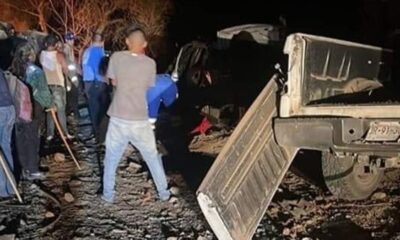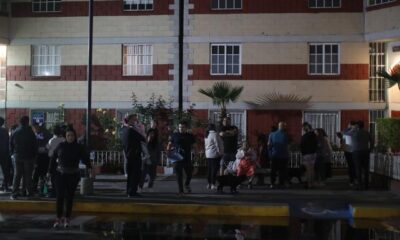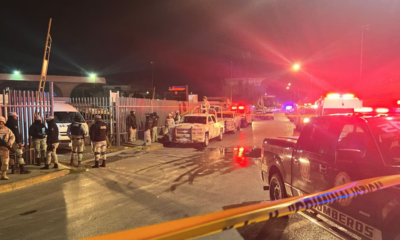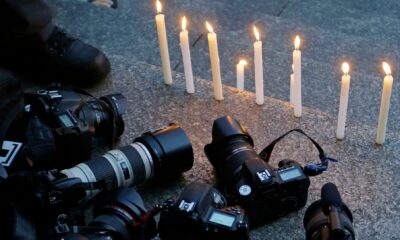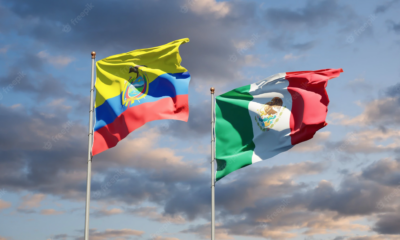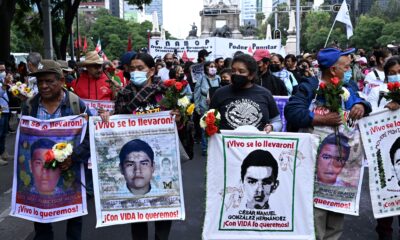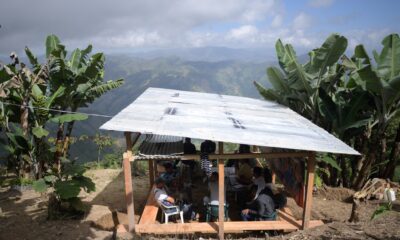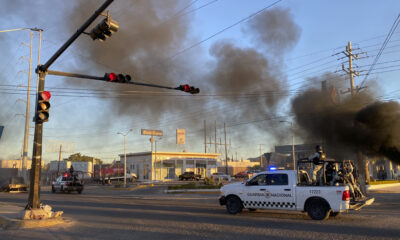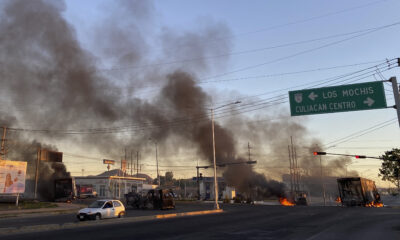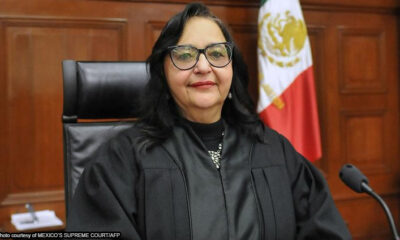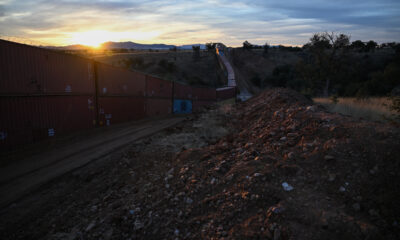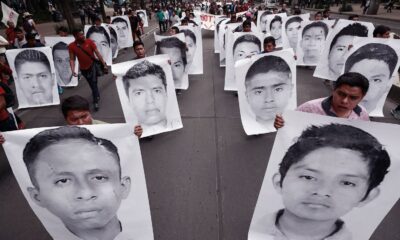International
Thousands of Mexicans protest against electoral reform promoted by Lopez Obrador
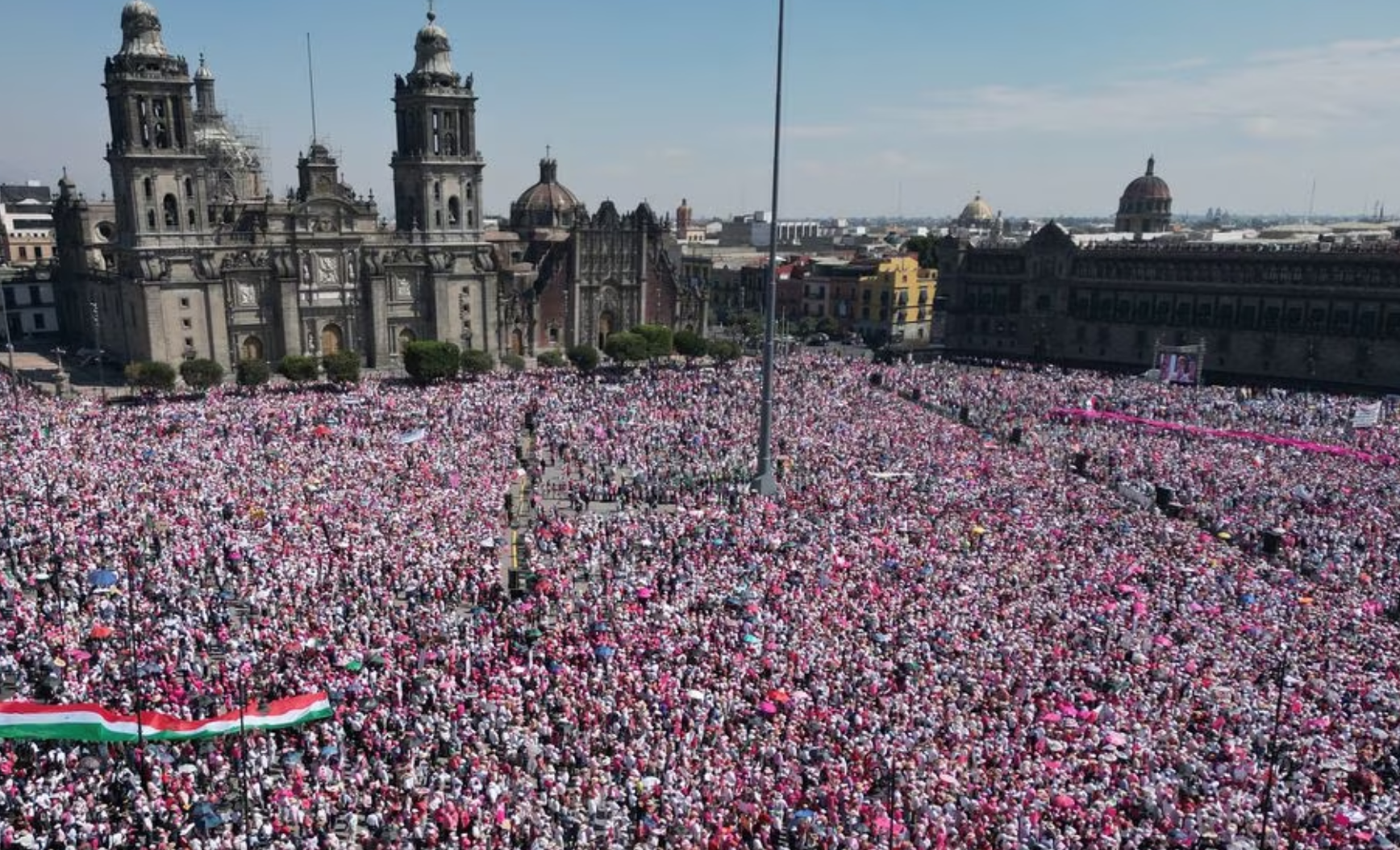
February 27 |
The Mexican opposition took to the streets this Sunday in several cities of the country to protest against a controversial electoral reform promoted by President Andrés Manuel López Obrador which, they allege, puts the 2024 general elections at risk.
On Wednesday, the Senate, dominated by the ruling Morena party and its allies, culminated the approval of a reform to the National Electoral Institute (INE) that, among other things, cuts its budget and competencies by closing offices and dismissing officials for millionaire savings.
In Mexico City, thousands of demonstrators filled the capital’s emblematic Zócalo square, the center of Mexican power, and surrounding streets, many of them dressed in pink, the color of the electoral institution that the protests have taken as a symbol.
Among the participants was Alejandro Moreno, president and deputy of one of the main opposition groups, the Institutional Revolutionary Party (PRI).
“We Mexicans are on the side of democracy, together we make ourselves heard so that the country’s democratic institutions are not destroyed!” said Moreno in a tweet accompanied by a photo of himself in the middle of the protests.
Veronica Echevarria, a 58-year-old psychologist from Mexico City who was participating in the protest, said she was concerned that the INE reform is an attempt by Lopez Obrador to take control of the electoral authority so he can stay in power.
“We are fighting to defend our democracy,” she said, decked out in a cap that read “INE is not touched.”
Late last year, thousands of people also came out to protest against the reform. Once it enters into force, the opposition will appeal the modifications before the Supreme Court of Justice.
The changes have been seen by analysts as an attempt by the president to weaken INE and generate a democratic step backwards. But the president has defended his initiative by assuring that it will strengthen democracy and reduce the influence of economic interests in politics.
“Normally, presidents seek to have governability and stability for their succession. But the president (Lopez Obrador) is generating uncertainty,” said Fernando Belaunzaran, an opposition politician who helped organize the protest.
This Sunday Belaunzarán announced on his social networks that there would be marches in more than 100 cities.
In June next year Mexicans will elect the successor to Lopez Obrador, a 69-year-old leftist who claims he was robbed of the presidency twice before he finally won a landslide victory in the 2018 election.
While the changes approved this week are less ambitious than the original constitutional reform sought by the president, they significantly modify the composition of INE and eliminate 85% of its professional service positions, a mechanism that guarantees equal opportunity in access to public administration based on merit.
According to INE’s own analysis, the reform puts at risk the preparation of the electoral roll, the installation of polling stations, the vote computations and the auditing of political parties and electoral campaigns.
López Obrador said this week that the institution is one of the most expensive electoral bodies, besides having an “anti-democratic” role, and described this Sunday’s protests as “a demonstration to defend the old corrupt regime”.
For many political analysts, INE and its predecessor, IFE, played a key role in helping to create a pluralist democracy that in 2000 ended decades of rule by the once all-powerful Institutional Revolutionary Party (PRI).
Polls show that Morena is the heavy favorite to win the 2024 elections. However, critics argue that López Obrador is not so confident that his party can retain power without interfering in the electoral process.
“(The reform) significantly affects INE’s operational capacity, as well as the organization of Election Day, which would be subject to multiple risks, given the weakening of the highest electoral body,” said Senator Gina Cruz, of the opposition National Action Party (PAN). “The ultimate and real purpose of the president is to steal the 2024 elections”.
International
Iran Reports 201 Dead, 747 Injured After U.S. and Israeli Strikes

The Iranian Red Crescent Society reported Sunday night (local time) that at least 201 people were killed and 747 injured following attacks carried out by Israel and the United States against the Islamic Republic.
A spokesperson for the humanitarian organization said more than 220 rescue teams have been deployed across affected areas and that relief operations are continuing without interruption. The official highlighted the difficulty of treating the large number of wounded and the urgent need for additional resources in impacted provinces.
Out of Iran’s 31 provinces, 24 have reported damage, according to a statement carried by the Isna news agency. This marks the first overall casualty toll released by Iranian state-affiliated media since the launch of the offensive.
Among the dead are 85 schoolgirls from a school in the southern city of Minab, according to the country’s judiciary. “The number of martyrs at the Minab girls’ school has risen to 85,” the local prosecutor’s office said, as quoted by the judiciary’s website, Mizan Online.
Iranian President Masud Pezeshkian described the attack as a “savagery” that “constitutes a new black page in the record of countless crimes committed by the aggressors.”
Meanwhile, the international community continues to monitor the situation closely amid concerns about possible further reprisals and the broader impact on Middle East stability, energy markets, and global security.
AFP noted that it was unable to independently verify the casualty figures or the circumstances surrounding the events.
International
Pope Leo XIV Urges End to ‘Spiral of Violence’ in Middle East

Pope Leo XIV on Sunday called for an end to the “spiral of violence” in the Middle East, following military strikes by the United States and Israel against Iran and subsequent retaliatory bombardments in the region.
“Faced with the possibility of a tragedy of enormous proportions, I urge the parties involved to assume their moral responsibility and stop the spiral of violence before it becomes an irreparable abyss,” the pontiff told the crowd gathered in St. Peter’s Square at the Vatican.
Speaking during the Angelus prayer, the U.S.-born pope said stability and peace cannot be achieved through threats or weapons. “Stability and peace are not built with reciprocal threats or with arms that sow destruction, suffering and death, but only through reasonable, sincere and responsible dialogue,” he declared.
The leader of the world’s 1.4 billion Catholics also called for diplomacy to “regain its role” amid escalating tensions.
In addition, the pope urged Afghanistan and Pakistan to urgently resume dialogue after several days of clashes between the two countries.
International
Security Council to Hold Emergency Meeting on Middle East Crisis

UN Secretary-General António Guterres on Saturday condemned the “military escalation in the Middle East” following attacks by the United States and Israel against Iran and Tehran’s retaliatory strikes, just hours before an urgent meeting of the UN Security Council.
“I call for the immediate cessation of hostilities and de-escalation,” Guterres said in a statement.
The Security Council is scheduled to meet on Saturday at 21:00 GMT (4:00 p.m. in New York) to address “the situation in the Middle East,” the United Nations announced.
The meeting, during which Guterres will deliver remarks, was convened at the request of France, Bahrain, Colombia, Russia and China, according to a diplomatic source.
-

 International4 days ago
International4 days agoFamily of “El Mencho” Seeks Return of Body After Deadly Military Operation
-

 International4 days ago
International4 days agoLarry Summers Steps Down from Harvard Role Amid Epstein Controversy
-

 International4 days ago
International4 days agoIran’s President Optimistic Ahead of Geneva Nuclear Talks with U.S.
-

 International4 days ago
International4 days agoBill Gates Admits “Serious Mistake” Over Epstein Ties
-

 International4 days ago
International4 days agoStephen Hawking Photo Appears in Newly Released Epstein Documents
-

 International3 days ago
International3 days agoCocaine Production Surges 34% in 2023 as Market Expands into Africa and Asia
-

 International3 days ago
International3 days agoFederal Judge Blocks Trump Policy Allowing Deportations to Third Countries
-

 International2 days ago
International2 days agoArgentina’s Senate Reviews Milei-Backed Labor Overhaul
-

 International2 days ago
International2 days agoTrump Floats “Friendly Takeover” of Cuba Amid Rising Tensions
-

 International3 days ago
International3 days agoClinton Accuses Republican Committee of Using Epstein Case to Shield Trump
-

 International23 hours ago
International23 hours agoSecurity Council to Hold Emergency Meeting on Middle East Crisis
-

 Sin categoría23 hours ago
Sin categoría23 hours agoTrump: ‘We Think It’s True’ Amid Claims Iran’s Supreme Leader Was Killed
-

 International4 hours ago
International4 hours agoIran Reports 201 Dead, 747 Injured After U.S. and Israeli Strikes
-

 International4 hours ago
International4 hours agoPope Leo XIV Urges End to ‘Spiral of Violence’ in Middle East





























